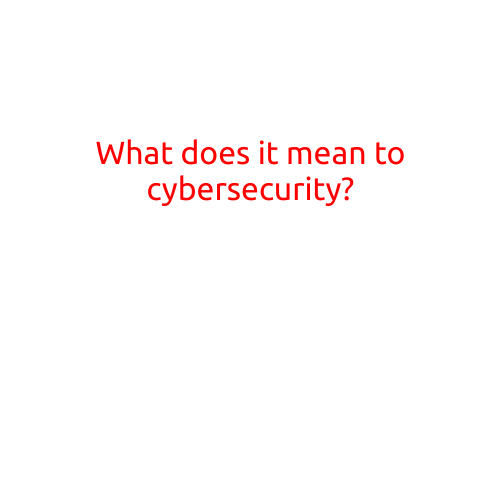
What does it mean to Cybersecurity?
In today’s digital age, cybersecurity has become an essential aspect of our daily lives. With the increasing dependence on the internet and online systems, the need for cybersecurity has grown exponentially. But what exactly does it mean to be secure in the cyber world? In this article, we’ll delve into the world of cybersecurity and explore what it means to be secure in the digital realm.
What is Cybersecurity?
Cybersecurity, in its simplest form, refers to the practice of protecting computer systems, networks, and electronic data from unauthorized access, use, disclosure, disruption, modification, or destruction. It involves a range of techniques and measures designed to prevent hacking, malware attacks, and other forms of cyber threats.
Why is Cybersecurity Important?
Cybersecurity is crucial in today’s digital landscape for several reasons:
- Protection of Personal Data: With the rise of digital communication, personal data such as financial information, passwords, and personal identifiable information (PII) are more vulnerable to cyber threats. Cybersecurity measures ensure that this data remains confidential and secure.
- Prevention of Financial Loss: Cyber attacks can result in significant financial losses, either directly through theft or indirectly through reputational damage. Cybersecurity safeguards financial transactions and prevents unauthorized access to sensitive data.
- Protection of Intellectual Property: Cybersecurity measures protect intellectual property, including trade secrets, patents, and copyrights, from being stolen or misused.
- Prevention of Disruption of Services: Cybersecurity ensures that critical infrastructure, such as healthcare systems, power grids, and financial institutions, remain operational and secure.
Types of Cybersecurity
There are several types of cybersecurity, including:
- Network Security: Protects computer networks from unauthorized access, intrusion, and data theft.
- Application Security: Ensures that software applications are secure and free from vulnerabilities.
- Endpoint Security: Protects devices, such as laptops and smartphones, from cyber threats.
- Cloud Security: Safeguards cloud-based data and applications from cyber attacks.
- Data Security: Protects sensitive data from unauthorized access, use, or disclosure.
Cybersecurity Measures
To ensure cybersecurity, various measures can be taken, including:
- Firewalls: Restrict access to networks and systems by monitoring and controlling incoming and outgoing network traffic.
- Encryption: Scrambles data to make it unreadable to unauthorized parties.
- Antivirus Software: Detects and removes malware from devices and systems.
- Regular Software Updates: Keeps software and applications up-to-date with the latest security patches.
- User Education: Educates users on cyber hygiene best practices, such as using strong passwords and being cautious with email attachments.
Conclusion
Cybersecurity is a critical aspect of our digital lives, and it’s essential to stay ahead of the ever-evolving cyber threats. By understanding what cybersecurity means and the various measures that can be taken to ensure security, we can protect ourselves and our organizations from the negative consequences of cyber attacks. Remember, cybersecurity is a continuous process that requires ongoing effort and commitment to stay secure in the digital world.





